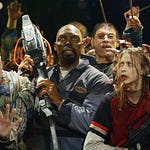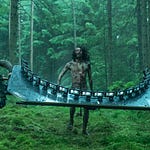This week I’m joined by Glenn Gordon Caron, the creator and showrunner of Moonlighting, to talk about that series’s long-awaited arrival on streaming. We discussed the show’s creation, the discovery of Bruce Willis, how he and costar Cybil Shepherd kept up with the show’s trademark rapid-fire patter, the difficulty in clearing music rights (and how Moonlighting was one of the first shows to heavily incorporate pop music into the show), working with legends like Orson Welles and Stanley Donen, and so much more.
If you’ve never watched the show, I highly recommend checking it out on Hulu; the folks at Disney have done an amazing job restoring the episodes. A handful of highlights, if you’re trying to figure out where to start:
Season 1, Episode 1: The Pilot. Tonally this is a bit different from what would follow, but it’s genuinely kind of wild to see Willis show up onscreen fully formed as Bruce Willis, Star in what was almost literally his first role.
Season 1, Episode 2: Gunfight at the So-So Corral. Again, the show is still finding its footing, but it’s a pretty good representation of the combination of smart dialogue, great casting, and clever resolutions to the onscreen mysteries.
Season 2, Episode 4: The Dream Sequence Always Rings Twice. Orson Welles introduced this episode—which is structured with a mysterious intro and then two dream sequences (one dreamt by Shepherd’s Maddie Hayes as a sort of MGM musical; the other by Willis’s David Addison as a sort of 1940s noir)—in part because the network was terrified no one would want to watch a black-and-white episode of TV.
Season 2, Episode 18: Camille. Whoopi Goldberg and Judd Nelson co-starred, and their mystery is all well and good, but it’s the closing sequence in which the (fourth) walls of reality come crashing in on the cast that makes this second season finale a must-watch.
Season 3, Episode 6: Big Man on Mulberry Street. The mid-show dance sequence was done by Stanley Donen, and, again, I just can’t imagine what it was like to have this sequence pop up in the middle of network TV in the 1980s. Wild stuff.
Season 3, Episode 10: Poltergeist III — Dipesto Nothing. One of the show’s episodes focusing on the adventures of Ms. Dipesto (Allyce Beasley) and Mr. Viola (Curtis Armstrong), who make for a delightful pairing.
Season 4, Episode 2: Come Back Little Shiksa. Shepherd had to leave the show for a while due to her pregnancy, which led to a series of episodes that separated her and Willis. But the creators used some clever ways to get them in the same room. Plus: John Goodman’s in this one!





















Maybe this is a sign we'll get to stream "Homicide" one day soon. What is it you guys at the Bulwark say? Something about rainbows and unicorns...
Yeah it’s wild how hard that show is to find.
I remember Willis as a bartender at Cafe Central on the Upper West Side, right before Moonlighting.
"A promise? No, that's not a promise! A promise is something you make to your mother to wear something itchy when it's cold outside. A promise is something you make very very late at night to get to the good stuff." [lives rent-free in my mind, at least that's how I remember it]
And needless to say, but I'll say it anyway, another great, great podcast!
I watched this series from its inception. One of my 80s favorites, along with Wiseguy and Miami Vice. Unfortunately, Moonlighting went up like a rocket during the 80s and came down just as fast. What really killed this show was Cybil Shepherd's pregnancy and Bruce Willis becoming an action start via Die Hard. The show really began to fall apart afterward, although it kept its sense of humor and meta perspective. ("You're back! Our audience! You're back!"). Not for long, it turns out. "Walter Bishop" had it right when he opined "America fell in love with you two falling in love. But you kept falling. You never landed anywhere". Caron also was involved with Remington Steele, which never attained the cultural heights of Moonlighting but managed to wrap up the show with a fairly decent finale and gave us Pierce Brosnan to save the 007 series.
I have introduced my daughter to a couple of old shows that I really enjoyed watching. Some of them she really enjoyed others not so much. X-Files is one that she has enjoyed but as you discussed with Glenn there is no way to adequately convey the anticipation of the next episodes and waiting for reruns if you missed it or didn't program the VCR correctly. Great show, not long enough show Thanks.
Yeah, The X-Files is probably the closest to that sort of experience I had growing up.
"Taming of the Shrew" was most memorable for me.
I love Moonlighting, gotta catch it again...lol
And Glenn is a sweetie and interesting, thanks
Sonny, next is Millenium w Frank Black (charactor name)!!!!!
Oh man, that is a show that NEEDS to be on streaming somewhere. I was probably too young to watch that when it was on originally, some real nightmare stuff on that show.
absolutely and so well acted w great production design. I always loved that his logon to the M computer was "Soylent Green is People"!!!!
I’ve often wondered how, with so many different writers and directors working on a series, there is such consistency from episode to episode. Got my answer. Thanks!!
I loved the one where they recreated Shakespeare’s “Taming of the Shrew”! Such a clever show. I remember it fondly and I’ve been happily rewatching.
No "Atomic Shakespeare"? I'll beat thee, but I would infect my hands.
My favorite. In my opinion, Mr. Viola steals the episode (and he’s stuck with all of the exposition).
It's so funny, I knew leaving this one off would be a controversy (not a nontroversy).